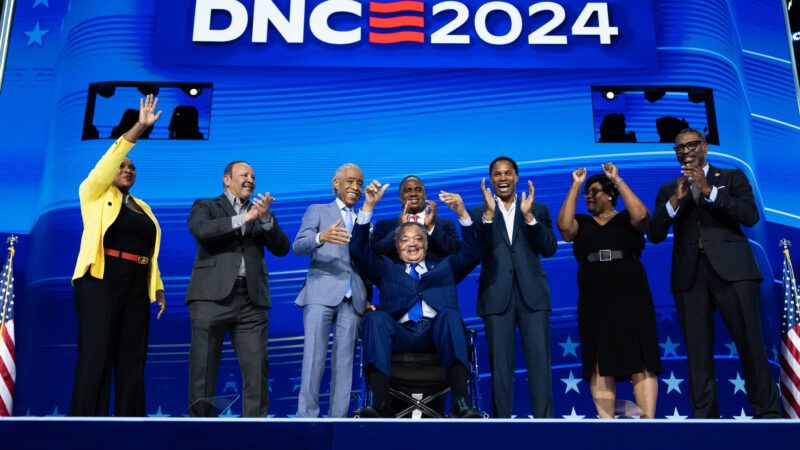The Democratic Party Platform Still Won't Commit to Legalizing Marijuana
Democrats' official 2024 platform praises President Joe Biden's marijuana pardons but fails to call for decriminalization.

Democratic delegates approved the party's 2024 platform at the Democratic National Convention in Chicago yesterday, including sections lamenting the unfairness of marijuana convictions. However, the platform failed to explicitly call for legalizing or even decriminalizing the drug, a change from its position four years ago.
"No one should be in jail just for using or possessing marijuana," the final 2024 Democratic Party platform reads. "Sending people to prison for possession has upended too many lives and incarcerated people for conduct that many states no longer prohibit. Those criminal records impose needless barriers to employment, housing, and educational opportunities, disproportionately affecting Black and brown people."
The platform praises President Joe Biden for his moves to reschedule marijuana and his "historic action to end this failed approach by pardoning people convicted federally for using or possessing marijuana." It also promises that Democrats "will take action to expunge federal marijuana-only convictions" and "combat drug trafficking and expand the use of drug courts, interventions, and diversion for people with substance use disorders."
Former Republican President Donald Trump's approach to criminal justice "could not be more different," the platform argues. "His Administration threatened federal prosecution for marijuana cases in states where marijuana was legal."
For opponents of drug prohibition, though, the platform is a step backward from the Democratic Party's 2020 platform, which said it was "past time to end the failed 'War on Drugs' which has imprisoned millions of Americans—disproportionately Black people and Latinos—and hasn't been effective in reducing drug use." That platform also said Democrats supported federal decriminalization and rescheduling of marijuana, and legalization of medical marijuana.
The Democratic Party's official position on marijuana prohibition continues to fall well short of its stated goal of ending the unfairness of the drug war. First, it conflates all recreational drug use with substance abuse and addiction, which is an atypical outcome.
Second, the platform rests on the illogical notion that it shouldn't be a crime to possess and smoke marijuana, but it should remain illegal to sell it to others to smoke. (Notably, Biden's "historic" pardons for marijuana crimes excluded people convicted of growing or distributing the drug.)
Third, while drug courts and involuntary treatment are preferable alternatives to prison, they are still heavy-handed government interventions against adults for their personal choices. Drug courts and diversion programs operate under the threat of incarceration for noncompliance—the metaphorical iron fist in a velvet glove.
Even measures that the Democratic Party no longer explicitly supports in its platform—such as changes to Justice Department policy and decriminalization—would leave the federal prohibition of marijuana dormant but intact for future administrations to revive.
This has already happened. Former President Donald Trump's first attorney general, Jeff Sessions, rescinded President Barack Obama-era memos instructing U.S. Attorneys to take a hands-off approach to enforcing federal marijuana laws in states that legalized the drug.
Mass pardons and expungements are commendable initiatives, but those also don't address the underlying criminalization of marijuana. Neither does rescheduling.
The Democratic Party's position on pot is closer in spirit to creaky old Joe Biden, who could never quite give up his drug warrior ways, than the party's new leading candidates. As Reason's Jacob Sullum recently detailed, Vice President Kamala Harris and Minnesota Gov. Tim Walz both support marijuana legalization, although Harris is a Johnny-come-lately to her position. She was laughing off questions about marijuana legalization in 2014, but by 2018 she had come around and cosponsored a bill in the Senate that would have repealed federal prohibition.
According to a Gallup poll published last November, a record 70 percent of Americans, including 87 percent of Democrats, favor legalization. If the Democratic Party's presidential ticket and nearly 90 percent of its voters think marijuana should be fully legalized, how long will it take the party to catch up?


Show Comments (29)